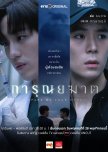
This review may contain spoilers
Light but for the alcohol
Light is the operative word to describe “All The Liquors”, a low budget Korean BL about a young marketing lad falling in love with the small restaurant-owning chef he persaudes to front one of his company’s alcohol product launches. Key to the series is the 20 year old Kim Jun Hyung, who combines light comic elements with his inherent cuteness to maintain interest in this love versus work plot line. His partner in love is played by debuting model/actor Won Do Hyun, whose wooden acting ironically turns out to be perfect for the hesitant lover.The cast is small, as in similar low-budget Korean shoots, like last year’s “Individual Circumstances” and the locations are limited. “All The Liquors” has the benefit of a city locale which adds some interest, although the poor audio quality inside the undampened box-like location of the chef’s restaurant represents an unusual drop in film production standards from a Korean production team.
“All The Liquors” had the potential it seemed at first to tackle a much more serious issue of over-consumption of alcohol in Korean society but managed to drop the ball on this opportunity and to reaffirm instead the dubious notion that too much Sujo is a good thing where it assists romance to flow.
Was this review helpful to you?

An interesting premise that failed to deliver
Nicely shot with an engaging musical soundtrack, this low-budget Korean BL suffers from being low ideas as well.Two film major students fall in love with each other at university without confessing it to each other, and later, as professionals in the industry, link up on a love story project whose subject mirrors their own experience. This premise ought to provide an engaging dynamic of characters learning about themselves and each other, but it is hampered by the limitations of a small cast, no subplot worthy of mention and overuse of the main location.
“Individual Circumstances” turns itself into a two-hander which would be fine if the individuals were fully fleshed out; they emerge instead as thin, without much in the way of endearing characteristics on which to explain their attraction to each other. The Director and his cameraman strike me as being aware of how thin is the script by shooting the house location more than the characters and at one point, in an effort to mix things up, crossing the line in one of their numerous sit-down static exchanges. The cast themselves do an admirable job: Kang Jun Kyu is the more experienced of the leads and it shows in his efforts to project Woo Jae’s inner turmoil; Han Jung Wan handles his debut role with confidence.
Ultimately, though, a drama in which there is so little physical action requires a concentration on the characters’ internal conflicts which underlie so much of the best Kdrama. Here, it’s hard to know what motivated either of these two guys to be drawn towards each other, other than the daily ritual of going with someone to grab a bite to eat.
Was this review helpful to you?

This review may contain spoilers
I haven't cried this much since UWMA
“Peach of Time” is as much a kdrama as it is a BL; in fact I suggest it is unique in being a hybrid and a very good one at that. It owes much to first-class performances from two of its leads.A ghost story might seem an unusual choice for the first Thai-Korean BL production to reach our screens; even more so as the story is not treated as a comedy. Had it done so, BL fans might have been as forgiving and accepting as they were with other ghost BLs such as “Something in my room” (2022), “He’s Coming to Me” (2019), “HiStory 1: My Hero” (2017), “So Much In Love” (2020). Dark subject matter, on the other hand, can generate negative reactions from fans who prefer their BL series to have happy endings.
The bad reviews of “Peach of Time” make me think there must be a lot of BL fans who have studied and read “Basic Behavioural Elements of Ghosts” or who have done courses on “Profiles & Studies of the Psychology of Ghosts in Human Interaction” (School of SE Asian Cultural Studies, 2020-2022). (I’m kidding - there are no such books or courses. But you get my meaning I hope.)
“Peach of Time” is not concerned with ghosts, and neither, I believe, need be the audience. Well, not actual ghosts (if you pardon the oxymoron). The ghost element is both a metaphor and a dramatic device; and the ghosts that feature large in “Peach of Time” are, as Mario describes them in Ep.3, the “ghosts” of resentment, or sadness, the emotional issues in our lives that we don’t address and leave unresolved, between ourselves and those we love, and that linger, like ghosts that hover and surround our lives. Hence, the series' main focus is in its title: time, and whether we make the most of it.
The drama plays out amidst a group of characters whose time together has ended prematurely by an unforeseen event. Each of the main protagonists, Jimmy Karn Kritsanaphan as Peach, Choi Jae Hyun as Yoon Oh (the two nascent lovers), and Jung Ae Yun as Dr Moon, Yoon Oh’s mother, react differently to the shock & suddenness of tragedy. How and whether they each come to terms with this is the real determinant of whether this series can be said to have a happy ending or not.
Cultural differences and similarities feature large in the drama. Peach is Thai and on this, his first trip to Korea, reacts at once with his traditional Thai view of parental regard to what he regards as Yoon Oh’s disrespect towards his mother; Jimmy plays these scenes with the diffidence and reserve familiar to all of us from so many Thai BL’s. Dr Moon, for her part, forgets her duty of care towards her one and only son; Jung Ae Yun gives expression to the high standards of achievement Korean parents expect of their children and the disappointment that her own success is not mirrored in her child. Yoon Oh anticipates his mother’s rejection of his expected repeat failure of the highly competitive Korean CSTAT exams. Choi Jae Hyun’s finely nuanced performance shimmers with the pressure and resentment young Koreans face today towards succeeding throughout their entire youth and early adult lives.
The background story of Yoon Oh’s mother, a practising cardiothoracic surgeon, who knowing the Thai language and has taught it to her son, helps explain Yoon Oh’s choice of Thailand for his holiday/runaway location, where he and Peach meet each other. Peach begins to study Korean to be able to speak with his friend as their relationship progresses. Those who quibble about the actors speaking in one language and being answered in another have, I would suggest, had no experience of how people in multicultural households communicate with each other. It was common, for instance, in my family and migrant community, for people to do the same as the characters in this show, and even to swap from one language to another mid-conversation, if not to do so even mid-sentence. Keep in mind that exchanging basic conversation, does not equate to being fluent; later we see Peach mix up the labels of the cakes in the cafe because he cannot read the Korean script correctly.
Being a kdrama, the plot carries with it a criminal-detective mystery component surrounding the event around which this story revolves. And added, also, is the story of a possible medical malpractice issue against Yoon Oh’s mother. There is a further subplot involving Tommy Sittichok Pueakpoolpol as Mario, a long lingering ghost at the resort owned by the Moon family. As is the way with kdrama, these concurrent plot lines simultaneously prolong the drama’s timelines while also - and this is a feature lacking in early low-budget Thai BLs - broaden the supporting world of characters beyond the immediate love interest leads.
The show loses its focus somewhat towards the end in striving to wrap up all its loose ends, but its conclusion rests in the safe hands of its principal leads, especially Choi Jae Hyun. At one point, Peach searches for the unhappy Yoon Oh; he realises Yoon Oh has voluntarily put himself inside his “naughty cupboard”, a relic of his upbringing, imposed or self-created we do not know. When Peach prises open the cupboard door, he observes that Yoon Oh has decorated the inside walls of the cupboard with photos of himself and his mother from happier childhood days. Peach’s face registers shock, but Choi Jae Hyun, without a word, through his eyes alone, speaks to us in this act of self-punishment, of his sadness and shame at what he perceives as his failure as a son.
Peach seems at first to be a slight character, as slight as his figure; but he is pivotal to the emotional journey of the main characters. Faced at first with learning about the tragic event which happened shortly before his arrival, he is confronted with having to make a decision for which he has no prior experience; but drawing on his own nature, his fondness for Yoon Oh and his Thai cultural background, he stays to do what he can to help Yoon Oh and his mother through their turmoil. Gradually, even Mario recognises in Peach an inner power towards love and reconciliation, which, to Mario’s surprise, aids him also.
Yeu Jeong Seob’s 5-year vigil for his daughter Eun Bin, in a coma, is another relationship under pressure and in distress.
The two investigative police detectives are also at odds with each other over the case; the senior officer feels for Dr Moon and the loss of her only child while the junior officer bristles at the investigation continuing and is content to wrap it up without further effort, even to the point of lying to his senior about obtaining critical video evidence. And at Dr Moon’s hospital, the administrator has been maintaining an approach solely to avoid a lawsuit against them by Yeu Jeong Seob, without any consideration for the father’s loss. Dr Moon, in turn, just as Peach has helped her, helps the grieving father by drawing a parallel between her reluctance to accept her son’s fate. This is a turning point in the Yoon Oh story; in their mutual grief, both parents recognise their mutual humanity. The father, in turn, reports to the police detectives a critical fact he had withheld.
Ignore the negative comments: “Peach of Time” is good and worth watching. But while it presents as a BL, it is more than that and what it sets out to do, it does very well. Audiences should approach it for what it is rather than what they hope it will be but isn’t.
Was this review helpful to you?

This review may contain spoilers
A serious subject handled well ... well, almost.
There is one over-riding reason to watch “The Effect”: to see the moving and deeply affecting performance of James Prapatthorn Chakkhuchan as Shin, the first year university student whose life is dramatically changed by his relationship with an older student. He captures the demure innocent-looking freshman with a convincing sincerity.Shin admits he’s not an ‘A’ grade or even a ‘B’ grade student, but that does not mean he can’t think for himself or have his own opinions. When senior student Keng (played with a nice degree of ambiguity by Oat Chakrit Boonsing) spots him on campus and, taking a liking to him, contrives to meet him, it sets in motion what could have been a story of the younger man discovering himself and falling in love for the first time. That would have made for a conventional Thai BL series familiar to all by now; but that is not what happens.
Instead, Shin’s misfortune is to be impressed by Keng’s surface allure of an A grade senior who, beneath his impressive resume, conceals his own secret struggle. Add to this Man, (played impressively if a little too villainy by Mike Weerapat Nimanong), a fellow senior who openly pursues the reluctant Keng, and “The Effect” takes this triangle love interest into the darker side of the powerful forces unleashed by attraction amongst the young.
The damaging forces that align to catapult Shin into injury, shame, depression and worse are painfully written in the performance of James Prapatthorn, who displays a remarkable emotional grasp of his character’s despair. The first-time director, Worawut Thanamatchaicharoen, does well to give him all the screen time he needs to chart his Hades-like descent, because in three hour long episodes, there is little time left over for the many other issues the drama raises.
The limited scale of this series results in numerous other matters being dispensed as if reading from a pamphlet on sexual violence; on top of that, parents are showing over-reacting with inappropriate responses, friends turn up with glib advice, doctors dispense pre-emptive medication with vivid descriptions of side effects for an affliction feared but not yet established and without at any time suggesting counselling for Shin’s trauma which is evident for all to see.
Worse is that the perpetrator of the violence keeps reappearing, spurred it would seem by the writers’ intent to fashion somehow, incredibly, a happy ending from the poisonous seed they’ve already sown into the plot. Certainly, Shin, with considerable justification, has made up his own mind about the senior he initially respected, yet the writers persist & insert a fantastical final plot twist, which is to no-one’s credit.
“The Effect” production is also plagued by the seemingly incurable Thai BL filming sins of staging dialogues in unnatural line poses, over-lighting interiors and unrealistic coincidences of characters arriving at a scene at exactly the right time to intervene in the action.
The series does not make for easy viewing. Still, the creative team are to be commended for tackling such a serious subject, and, thanks hugely to the casting of James Prapatthorn as Shin, they get most of it right.
Shin’s initial admiration of Keng stems from what he himself calls his gut instinct; he is more guarded later when Man takes a surreptitious photo and uses his seniority to imply that he could be trusted how he will use it. As events escalate, Shin’s confusion about developments beyond his control and his powerlessness in the face of a social media tide are both etched in his face and reveal better than words his struggle to articulate responses that will steer him between the competing elements that have invaded his life. When he senses he may have feelings for Keng, his instinct stops him from acting on them; but what is at play here is no longer Shakespearean - Shin’s fate doesn’t rest on his own character. Instead, it has become classic Greek tragedy, where Shin has become a plaything of the gods, at the mercy of others.
When, at the series end, he finally wrests back control of his own life, it would be nice to think that the bad that happened to him was now in the past. But here the creatives upended their own good works; we know traumas such as Shin suffered are not magically erased by three years of work & study and gaining a degree; nor are wrongs erased by wistfully sighting the guy you still have feelings toward after a long absence.
There is a postscript note the producers have inserted referring to Shin and Keng having found a new place; in my view, it is as crass a piece of after-the-event plot connivance as I’ve come across. It should be ignored.
Was this review helpful to you?

This review may contain spoilers
Falling in love gradually, and charming us all the way.
“Ingredients” is essentially a low budget two hander; but that description belies the seductive charm of its two leads and the captivating way it progresses from its initial concept to its final outcome.Initially conceived as a ten x 6 minute ep. romantic BL-themed foodie series on behalf of a Thai grocery chain to promote their products, the audience response apparently prompted a revised expanded show.
The key to its success is its casting of Jeff Satur and Gameplay Garnpaphon Laolerkiat, both experienced 26 year old actors, and both of whom were familiar with having played opposite each other previously, in the 2019 drama, “He She It”. Here, Satur plays Win, an aspiring songwriting musician, which he actually is, and Gameplay plays Tops, an aspiring chef, which he actually is also. This lends credibility to much of the action, of which, in a 6 minute episode, there’s not a lot. But, what is in abundance, is the almost accidental blossoming of a romance behind the most familiar of situations, house-mates sharing their days.
The story-line, such as it is, concerns Win preparing for his exams and Tops researching and trialling recipes for potential future use but which he uses in the present to aid or defuse a variety of problems that pop up in their lives. Tops is always there for Win during these moments and that reassuring presence creates a bond.
The show is not without its problems. There are the familiar defects in Thai productions of over-lit photography and unnatural set-ups; and the show is at its weakest when multiple other characters crowd into the modest location set used - at those times, the audio echoes and the camerawork loses focus. But these are compensated by the conversational almost improv style exchanges between the two leads in their solo scenes and the fluid camerawork responding to their dynamics. These scenes are the highlight of the show.
In between all of this, Satur entertains the audience with his casual but accomplished guitar work and songs that show off his warm and melodic voice, while Gameplay’s culinary dash in the kitchen scenes has professional flair.
Satur and Gameplay play and spark off each other with a disarming naturalness that made me feel like the proverbial “fly on the wall” observing private revelations. The progression to affection, and thence to confession, just in time for a forced parting, yields some of the most endearing and convincing of scenes between romantic leads in the BL genre. The long final meal scene in Ep. 21 looks like it was a multi-camera single take scene, but it also felt as if the two young men were genuinely sad their relationship in making this show was coming to an end. As did I.
Was this review helpful to you?

This review may contain spoilers
An interesting premise but a disjointed plot.
“The Tuxedo” has an interesting premise, one of the best OST’s to come out of the Thai BL genre, and the appealing Green Phongsathorn Padungktiwong who plays the lead character. The director is Mike Phontharis Chotkijsadarsopon, whose previous stint at the helm of a BL was the mafia crim series “Golden Blood”. All up, “The Tuxedo” looks like a stylish movie but feels like a romantic soap.For all its good aspects, it has a long list of bad ones, most notable of which is its co-lead Chap Suppacheep Chanapai, who, despite his extensive list of acting credits, turns in quite a mediocre performance as the illegitimate scion of a wealthy industrialist and who suffers from a chronic syndrome stemming from childhood trauma (I”m guessing agoraphobia, although no doctor or therapist appears in the show to confirm this). Chap plays Nawee, an arrogant young man who somehow manages for three years to be the CEO of production in his father’s business while maintaining a reclusive existence in a sumptuous modern architect designed house & enclave in an obscure part of the country. Chap plays his scenes of panic attacks as if he were drugged; perhaps Director Mike & Chap preferred that Narwee appear to act more like he had a chemically-induced condition than a psychologically disturbed one. In any event, he is ultimately saved from his predicament by the love of Aioun, a fastidious high-end tailor, who runs an exclusive bespoke business from idiosyncratically designed premises in another obscure location.
The developing love story of these two men from different backgrounds who meet by strange circumstance is told with engaging sincerity; and the chemistry between the two leads is warm and convincing. The problem with the series is that instead of the plot concentrating on this, it meanders to include characters who are of little interest and omits other characters and situations that could have added to the drama. In this respect, unfortunately, the series shows the inexperience of newbie screenwriter Pacharawan Chaipuwarat.
Elsewhere, the writer has written of her script writing that she creates “the story based on public or client interests and conduct(s) research to obtain accurate factual background information authentic details.” This admirable work formula reveals itself in the detailed scenes of Aioun’s design work and pattern-cutting and suit-making (similar scenes to “Behind cut”). But attention to client (aka producer and/or director) interests can mean an inexperienced writer who is either not confident in how to put together a cohesive plot or who is reluctant to stand up for it in the often combative pre-production meetings. Whichever is the case, “The Tuxedo” includes Aioun’s two younger “brothers”, two elderly staff, Aioun’s fiancee, Narwee’s father & step-mother and step-brother, who all play minor roles in a very haphazard flow of sequences. The only additional character who is melded well into the story is Sichol, played by Tape Worrachai Sirikongsuwan. Tape has been acting for almost ten years and, though his character is largely comic in nature, he has enough scenes to show his capabilities and to draw Sichol as equally bumbling and caring.
Sichol is the character who connects the two leads together when he goes to the rescue of Aioun’s young brother, Oab, mugged at night by three ruffians. By way of thanks for helping Oab, Aioun offers Sichol a new suit to replace the one damaged in the brawl so that Sichol can still look presentable at his job interview the next day with Narwee. At that interview, the curt & dismissive Narwee likes nothing about Sichol but is attracted to the quality of the suit and offers Sichol the job if he can fulfil the task of getting the tailor who made that suit to make one for Narwee also.
Unbeknownst to both Sichol and Narwee, Aioun’s father had had his business ruined by the sharp business practices of Narwee’s father; not surprisingly therefore, Aioun turns down the suit request. We learn the reason Narwee is insistent on the best suit to be found hereabouts is because he is relying on it to impress his father at an upcoming birthday lunch Narwee is planning. We find out later that Narwee is his father’s bastard son who has been raised and elevated to a senior position in the father’s business but is now to be replaced by Narwee’s younger half-brother.
Given how important Dad is to both of the leads, it is a question worth asking why he appears in only episodes 5 & 6 (there are only 8 episodes). Unlike their Korean counterparts, a repeating habit of Thai BL creators is to put minor characters into set scenes in block fashion. I suspect this is for scheduling & budgeting reasons. What this means is that, unlike in real life where the people around us feature in many incidental ways, characters in Thai BL series appear to play a major scene and then disappear.
And this does not only apply to the Dad in “The Tuxedo”. (Aioun turns out to have a GF - we don’t learn of her existence till episode 6.) The show itself begins with neither Aioun or Narwee but with two minor characters, an elderly lady, one of Aioun’s employees, and Oab, Aioun’s young brother. Oab is an annoying fellow, whose main dramatic purpose is to so annoy his brother Art that Art revenges himself by concealing from Oab the client measurement book on which Aioun’s business depends. This irresponsible act is forgiven by Aioun (showing us his sympathetic considerate nature), even though it compels Aioun to make the trek to Narwee’s house to remeasure for the suit, hence another interaction in the developing love story.
The measurement book appears more often than some of the minor characters; it is a substantial soft leather cover journal; it is believable as a work item. But when Art conceals it in a pile of discarded fabric cut-offs, we are asked to believe that the elderly lady who cleans out the cut-offs, can’t feel the odd shape and weight of the journal concealed within the fabrics. Anyone who’s worked in the rag trade would know what a pile of fabric cut-offs weighs; cutting fabric is a skill - the less fabric cut from the roll, the lower the cost; and as another poster has pointed out, the wool fabrics suited to the Thai climate would be lightweight.
This “now you see them/now you don’t” approach to character appearances is at its worst in relation to Aioun’s GF, Chanjoa. She appears in only episodes 6, 7 & 8. She turns up at Aioun’s Birthday dinner celebration where she is aggressively spoken to by Narwee, angry at the discovery his love interest has a woman in his life. Aioun pacifies Narwee later by declaring his love, although Narwee will - after several more panic attacks - break off the relationship in childish jilted-lover fashion. Before this, however, Chanjoa is dispensed as a character in a remarkable scene where Aioun, tongue-tied, can’t find the words to explain why he is breaking off their relationship. Chanjoa departs the series (just in time for the final reconciliation of our lovers), walking out the door more of an adult than either of the two male leads.
As if Director Mike realises this disjointed story line has not created sufficient romantic atmosphere & tension, the scene at the end of the two lovers firmly committed into each others’ arms is played out against a five minute recap of their main scenes together from earlier in the series. Most avid BL fans know by now from the increasing flow of quality BL series out of Korea that the final scene is critical to the credibility of the love story and how well, for the most part, Korean creatives handle this aspect. “The Tuxedo” scores low in this regard.
Rewatch value is low. But on the plus side, Jeff Satur’s compositions on the music track are very good; the theme from his song “Because of you” is of sufficient quality that it works as a stand-alone orchestral piece.
A final word about Green’s performance. He succeeded in making Aioun the emotional centre of this show with his sympathetic performance. Aioun is both a creative artisan and a firm and successful businessman, but he is also the central axis of love and leadership around which his brothers and employees revolve and to whom Narwee gravitates. Green achieves this combination balancing act in a nicely sustained performance; hopefully we will see more of his talents in future series.
Was this review helpful to you?

A slow drive about town.
This film is supposed to be a slow burn; it isn't. It's supposed to have hot sex scenes in it; it doesn't. It's supposed to have a storyline with a twist: It never happened. Instead we are served a chauffeur in a badly tailored jacket, and a supposedly wealthy wife who lacks any poise or class. That such a thin idea should have been funded into a motion picture is depressing because it makes me wonder what even worse script ideas are there out there that are being knocked back to make way for this one. What this film does have is a lot of is some terrific looking expensive and stylish locations. I guess you call call this film "real estate porn"; watch it to see what most of us are missing out on.Was this review helpful to you?

This review may contain spoilers
A more dramatic companion piece to "A Dating Sim"
In some ways, a companion piece to “My Dating Sim”, “Business As Usual” is a more angst-filled version, and it takes off where “My Dating Sim”, in a sense, ended.It includes two fellow office workers, highly credentialled, one a designer, the other an editor, working on a joint project referred to as a Dating Manual. Min Jun and Jin Hwan had had a passionate but brief fling when at university together, and now, eight years later, they reunite at their workplace and try to put back together the broken pieces of their previous relationship.
The title, “Business as usual”, is double entendre, meaning the pair of former lovers behave towards each other on a business level, and on another level, it means the outcome of their relationship now will be the same as before. Some considerable time and effort is devoted to the two leads working out what went wrong eight years ago and trying to see if a second attempt at a relationship will be better than the first.
All those well-meaning posters on social media who “wish the characters would just talk honestly with each other” are met here with the reality of sometimes that just isn’t enough. Even when Min Jun realises the mistake he made and breaks down with the sadness of what his misunderstanding cost him, his residual fear of further heartache dominates his actions. Played with well-judged restraint by debutant actor Chae Jong Hyeok, Min Jun is the inner voice inside of all of us that says, “But wait, what if I’m wrong…”.
Director Min Chae Yeon, in her second BL series, judges the mood nicely throughout, such that the various loose ends in the supporting characters and story lines do not feel as if they in any way spoil the happy ending.
Was this review helpful to you?

A light romantic comedy
Watching this was a bit like eating fairy floss - similar to what you've eaten as a kid a long time ago and tempting to try again but only in a small amount (only 10 episodes - good choice, guys) because after being reminded of the familiar flavour, it's time to smile, give thanks, and move on to something more substantial.The music is nice, the photography good, and the sound goes a little awry at the end but otherwise, it's a technically good production.
Hong Wei Che plays goofy well and Yang I Hsuan plays a straight serious face like an Okame mask. The two actors look to have fun with each other although neither appears to be experienced in the kissing department, which in any event, suits their characters.
Was this review helpful to you?

Takes itself too seriously.
A series where the parts were often achingly beautiful yet failed to add up in the end to a satisfying whole. Extending the high school crush into college and then adding the possibility of a third wheel provided the writer/director with lots of opportunity to create confusion in the audience about the likely ending, but the road to get there was lengthy and insufficiently entertaining to be meaningful at the end. Beautiful to look at but emotionally unsatisfying.Was this review helpful to you?

A triumph for Ton Tonhon Tantivejakul
Made with great respect and affection for the country and its people, "Lost in the Woods" owes a great deal to the charms and acting skills of its young lead, Ton Tonhon Tantivejakul, who embodies the shape and mind of a late age teenager falling in love for the first time. While some parts of the action felt like fill, barely a scene featuring Ton as Fifa didn't afford some opportunity for this considerable talent to show how gesture, look, pauses and sighs can say as much if not more than the dialogue penned in the script. What Ton does in this series is create a character that lives on after the final credits. It is a remarkable achievement.Was this review helpful to you?

This review may contain spoilers
A psychological love mystery tale
“The Yearbook” is more of a psychological love mystery tale; it lives in the minds of its protagonists and their actions only obliquely reflect their thoughts and feelings. It’s neither a great success nor a great failure but it is different in ways which might challenge some viewers. It deserves a look and especially for the discovery of Title Teshin Anusananan in the lead role. (He looks even more handsome with his own hair style, btw; his hair was cut short for the role.)It’s almost impossible to know if this series was a great idea poorly executed or an amateur effort from the beginning. So many people associated with this series (director, writers, lead actors) were newbies (Man admitted that on his first day on set he didn’t even know the different instructions for slate/action/cut) that the story feels like it went into production half-baked and with seemingly no-one in control with the experience to know how to fix it.
So what is the problem with this series? It aspires to be a tear-jerker and creates a foundation story in the early episodes similar to other BL’s where the two male lead characters have known each other since childhood and who realise as they approach young adulthood that their closeness is more than friendship. The story uses flashbacks to regularly reference events in their recent and more distant past; some viewers have found this device to be repetitive and obstructive to the story’s trajectory. But I think the flashbacks suit “The Yearbook” as a mood piece; I didn’t feel to me like the usual BL situational drama.
The title “The Yearbook” is the key to what I believe the writers might have had in mind in creating this show. References to time are the clue; ostensibly, the time frame spans the lives of Nut and Phob from childhood to their early 20’s, but this is not the primary concern. “The Yearbook” is more concerned with time as it manifests itself in their minds, and in our minds we continually think over the events of yesterday as much as we do the events of last year or earlier. The young men are constantly referring back to the small moments as well as the big incidents between them, and we, the viewers, see this in the flashbacks. And the revelations via flashback are not chronological as to what each character is thinking or feeling.
Just as in real life, the boys in their minds relive the same moments again and again; this appears to have confused some viewers who can’t grasp why the same scene is being shown more than once.
(Spoiler ahead) If I’m right interpreting “The Yearbook” in this way, then the uncertain ending is also part of this approach; the future facing the young men is far from rosy or clear. Neither Nut nor Phob are secure in their futures to be pledging themselves to each other and the expectation that Nut, still a medical undergraduate, could take on by himself the medical, emotional and financial burden of Phob’s care & rehabilitation is taking Thai BL fantasies into new stratospheres of separation from reality.
Some have commented that almost nothing happens in the last episodes; this misunderstands the story. The entire series depicts the gradual realisation of love and then from that realisation, on to their commitments to each other, forged out of a crisis neither was prepared to face at first. Emotional journeys in my view are not the same as plots which are based on action and “The Yearbook” is thin on plot, thick on emotion.
The upshot of this is that big demands are made of the young actors for performances to reflect what is happening internally to their characters. Title is amazingly good but Man struggles in places. (Personally, I can’t get past the amateur if not outright cruel scheduling of putting Man’s most emotionally difficult & demanding scene on Day 1 of the shooting schedule. A newbie especially would benefit from the chance of growing into the demands of the role for a week or two before the heavy stuff is shot.)
Mean’s freshman directing effort is adequate but someone surely has to take the blame for the incessant music which is relied upon to excess IMO for emotional impact to bolster the drama.
Finally, ignore the MDL description of 8 x 50minute episodes. I suspect the show was created to achieve a friendly rating and to fit a one hour time-slot on afternoon tv. But not a single episode manages the 50 minutes minus the credits. The script is underdeveloped and has been stretched; this is clear from the fact that every episode has “fill” of interviews and similar that follow afterwards, culminating in the final episode, No. 8, being only 28 minutes in length, following which there is a further 25 minutes of interviews and behind the scenes. (Viewed on Riki Vakuten.)
Was this review helpful to you?

Yes, gay parents can raise a happy gay child
Occasionally charming, frequently irritating, almost always excruciating in its inept performances and writing, “AiLongNhai” is a potentially good idea that needed more care and thought to pull off.Can a pair of gay parents successfully raise a child, and can they model a happy relationship to that child, and especially if the child is gay? The point of “AiLongNhai” is to answer ‘yes’ to both questions. It also introduces us to two very different characters, one raised in comparative wealth and who has an assured manner about him in the world, and the other, a young man reluctant to grow up to adulthood (nicely metaphored as the yellow plastic duck found in bathtubs). There is potential here for something interesting, but it fails to do so and became for me one of the hardest series to finish watching.
Ai, played by Meen Nichakoon Khajornborirak as if trying his hardest to remember his lines, has been raised by his gay father and his partner; he falls for the perpetually childish Nhai, played with appropriate surface shallowness by Ping Krittanum Anunchananum. Run Kantheephop Sirorattanaphanit’s debut outing as a screenwriter shows a newbie’s poor scene structure and preference for episodic incident over character development. Even the more experienced Director, Nob Sathanapong Kim Wongthong, can’t save this series from being a continuing experience of under-delivery.
Was this review helpful to you?

This review may contain spoilers
BL baiting at its worst
BL baiting at its worst. It's hard for me to be kind towards this series which took a serious subject and minimalised it. The avoidance of the romance made the final concoction even worse, because the inherent conflict of love and death is the stuff of the real world. In the end, the creatives wimped the story into a simplistic crime story. Saving the characters' struggle with the ethics of euthanasia to one scene at the end only made the whole thing worse. The actors were good and deserve a better vehicle for their smouldering good looks and physical attraction.Was this review helpful to you?

Worth every minute of watching
The achievement of "My Personal Weatherman" is to take two characters, unlike each other in so many ways and seemingly so incompatible with each other, and by sleight of hand almost, show them understanding themselves and each other more, so that, by the end of this modest 8 episode series, their relationship evolves beyond the initial physical connection to more solid love and respect. Worth every minute of watching.MDL requires minimum 500 word reviews, so it's worth repeating:
The achievement of "My Personal Weatherman" is to take two characters, unlike each other in so many ways and seemingly so incompatible with each other, and by sleight of hand almost, show them understanding themselves and each other more, so that, by the end of this modest 8 episode series, their relationship evolves beyond the initial physical connection to more solid love and respect. Worth every minute of watching.
Was this review helpful to you?

 1
1





